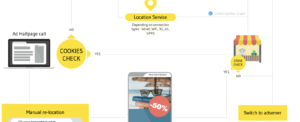
How does geotagging work?
21 November 2017
Geotag on the Internet is usually done in two ways: One way is with the computer IP-address, the other with the HTML5. Proxistore has been able to develop his own geotagging system which is unique in Europe. But how exactly does all of this work?
The Internet Protocol address (IP address) is a unique ID that allows us to identify each computer on the Internet. Most of the time, those numbers are attributed by country and therefore allows us to distinguish the country in which the computer is located. However, the IP-address remains less accurate when it has to identify a computer within a district or a neighborhood.
Getoagging with HTML5 is possible by collecting data on our browsers (such as Firefox, Safari, …). Those data can whether be IP address, GPS data, SSID, specific data the user gave, etc.
As for Proxistore, the company has set up a geotag cascading tool which is unique and patented in Europe and based on the HTML5 and the requalified IP-address.
So it is now possible to detect automatically the surfer geographic location with his browser, but only if he uses a HTML5 technology. In this case, consent is first necessary (agreement via a confirmation window on the screen) so that privacy rules are respected.
The geotag cascading of Proxistore allows us to make up for the inaccuracy of the IP-address and offers a unique geolocating system extremely accurate respecting user’s privacy.
How does the patented geotagging system of Proxistore work? (lien)
What are the laws regarding privacy and geolocation? Proxistore is subject to the law of December 8, 1992 related to the protection of the privacy with regards to personal data. Personal information and data that may be collected by Proxistore regarding users are the following: - their internet domain ; - their computer IP address ; - all the information regarding the visited Proxistore website pages and the last actions that have been made. The publisher of one or more websites commit themselves to obtain users’ permission when visiting these websites so that they can agree to be geolocated
Press contact

- julie.dambly@proxistore.com
- +32 479 67 81 96





